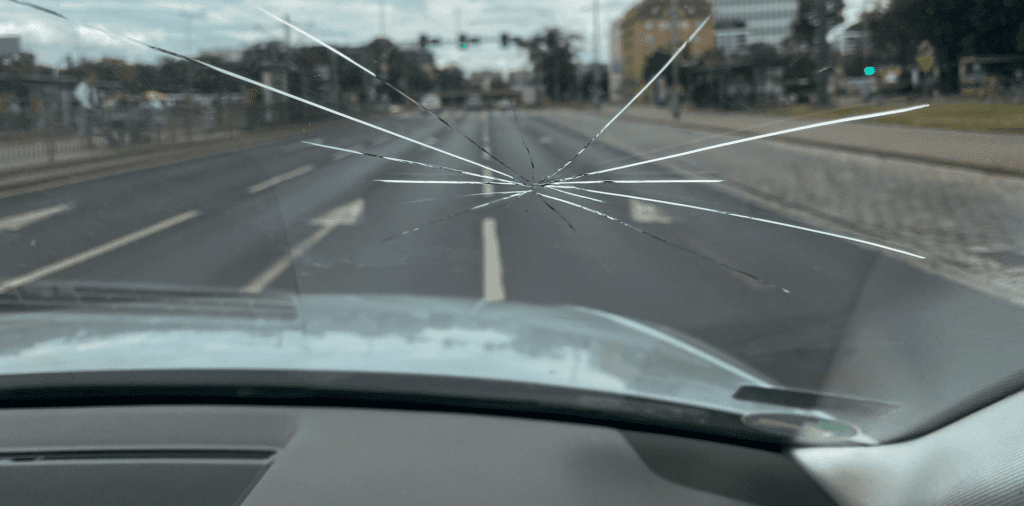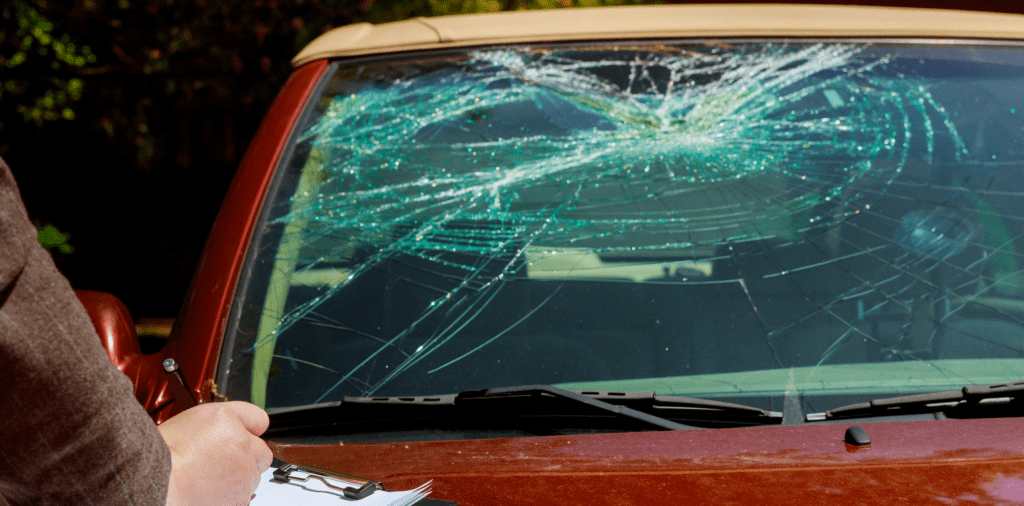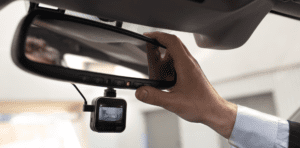Compare cheap car insurance
✔ Compare cheap car insurance quotes
✔ Over 110 insurance providers
✔ Get a quote in minutes
✔ Save up to £504*
If you find a chip or crack in your windscreen, it’s important to address the issue swiftly. This kind of damage is quite typical, yet prompt action is crucial.
- What Causes a Cracked or Chipped Windscreen?
- How Serious Is a Windscreen Crack?
- How Do I Prevent a Chip in My Windscreen from Spreading?
- Can You Drive with a Cracked Windscreen?
- Can a Chipped Windscreen Fail an MOT?
- How Can I Protect My Windscreen?
- Does My Car Insurance Cover Chips and Other Damage to My Windscreen?
- Frequently asked questions
Thankfully, repairing a windscreen chip is usually a simple process. The cost and ease of the repair can be significantly reduced if you are covered by appropriate insurance.
What Causes a Cracked or Chipped Windscreen?
Common Causes of Windscreen Damage
The majority of windscreen damage stems from loose stones or gravel that are projected onto the windscreen from the road. In addition to this, your windscreen can suffer dents from a variety of other sources.


For instance, tree branches or other forms of debris can cause damage when they are propelled by strong winds. Hailstones are another common culprit, as are unexpected impacts from things like bird strikes or even golf balls.
The Spread of a Windscreen Chip
A small chip in your windscreen might remain unnoticed for a considerable time, possibly months or even years. However, it can unexpectedly escalate into a significant crack, sometimes while you are driving.
This sudden change can often be attributed to fluctuations in temperature, especially on days that are unusually hot or cold.
Unpredictable Cracking
At times, a chip might evolve into a crack without any discernible reason. This unpredictable cracking can be frustrating and might seem like sheer bad luck. It’s a reminder that even minor damage should not be ignored, as it can potentially lead to more serious issues in the future.
How much can you save on your car insurance?
How Serious Is a Windscreen Crack?
Risks of Ignoring a Small Chip
When you notice a minor chip in your windscreen, it might seem insignificant. However, disregarding it is not advisable. A small chip can rapidly expand into a large crack, and in extreme cases, it might lead to the windscreen shattering.


This progression from a minor flaw to a significant safety hazard underscores why it’s important to address even the smallest chips promptly.
Impaired Visibility and Safety Hazards
A cracked windscreen poses several dangers, primarily concerning safety. Firstly, it can significantly obstruct your view of the road, especially in conditions like bright sunshine.
When sunlight hits the chips or cracks, it can cause a dazzling effect, making it difficult to see and increasing the risk of an accident.
Impact on Vehicle Safety Features
Additionally, a crack in the windscreen can affect the performance of safety features like airbags. In the event of an accident, a compromised windscreen can lead to airbags inflating incorrectly, which can endanger lives by reducing the effectiveness of these critical safety systems.
Structural Integrity and Accident Risks
In more severe scenarios, such as a car rolling over in an accident, a cracked windscreen can be a significant liability. The windscreen contributes to the vehicle’s overall structural integrity, particularly the strength of the roof.
A damaged windscreen means the roof is more susceptible to collapsing under pressure, which increases the risk of serious injuries in such accidents.
Key Takeaway
A cracked windscreen is not just a cosmetic issue but a serious safety concern that requires immediate attention to ensure the safety and integrity of your vehicle.
How much can you save on your car insurance?
How Do I Prevent a Chip in My Windscreen from Spreading?
Immediate Repair: The Best Solution
The most effective way to deal with a windscreen chip is to have it repaired as soon as possible. Prompt repair not only prevents the chip from expanding into a larger crack, but it’s also more economical.
Repairing a small chip or crack is significantly cheaper and faster than replacing a fully cracked windscreen.
Temporary Measures to Minimise Spread
While you arrange for a repair, there are interim steps you can take to help contain the damage.
Sealing the Chip
One temporary fix is to seal the chip using epoxy or acrylic adhesive. This method can prevent dirt and moisture from entering the chip, which might otherwise exacerbate the damage.
Managing Temperature Variations
Avoid exposing your windscreen to abrupt temperature changes, which can cause a chip or crack to spread rapidly. For example, directing a heating vent straight at a chipped windscreen in cold weather could worsen the crack.
Similarly, pouring warm or hot water on a cold or frozen windscreen is a common mistake that can lead to the rapid spreading of cracks.
Additional Precautionary Tips
- Gentle Handling: Be gentle when closing car doors or handling the windscreen, as strong vibrations can worsen the damage.
- Avoid Rough Roads: If possible, steer clear of bumpy or rough roads, as the jolts and vibrations can cause the chip to expand.
- Regular Checkups: Regularly inspect the chip for signs of spreading. If you notice any changes, it’s time to seek professional repair services.
Key Takeaway
While these measures can help slow down the progression of a chip, they are not permanent fixes. It’s essential to arrange for a professional repair as soon as possible to maintain the safety and integrity of your windscreen.
How much can you save on your car insurance?
Can You Drive with a Cracked Windscreen?
Understanding the Legal Implications
Driving with a cracked windscreen might lead you to question its legality. The severity of the crack plays a crucial role in determining whether it’s legal to drive your vehicle.


The Highway Code and Vehicle Roadworthiness
According to The Highway Code, all vehicles must be in a ‘roadworthy’ condition. This encompasses the condition of windows and windscreens.
Drivers are required to have an unobstructed view of the road ahead, and it’s essential to maintain the glass in clean and good condition.
Legal Consequences of Impaired Visibility
If your windscreen is cracked in a way that hampers your view of the road, driving such a vehicle can lead to legal repercussions.
If you’re caught driving under these conditions, you might face penalties including up to three penalty points and a fine of up to £2,500 for operating a vehicle deemed in a dangerous condition.
Risk Assessment and Safety Considerations
Size and Position of the Crack
- The size and location of the crack are critical. A small chip in the corner might not significantly obstruct your view, whereas a large crack across the driver’s line of sight is undoubtedly hazardous.
- Cracks in the driver’s line of vision are more likely to be considered a danger to road safety.
MOT Certification
- It’s important to note that these rules apply regardless of whether your vehicle has a valid MOT certificate. An MOT does not guarantee that the vehicle remains roadworthy thereafter, especially if new issues like a windscreen crack develop.
Potential Risks While Driving
- Besides legal issues, driving with a cracked windscreen can pose safety risks. It can impair your ability to see other vehicles, pedestrians, and road signs clearly.
- In extreme weather conditions, a cracked windscreen is more likely to fail completely, which could be catastrophic while driving.
Key Takeaway
While a small, non-obstructive crack might not immediately deem your vehicle unroadworthy, it’s essential to assess the risk it poses to your visibility and overall safety.
When in doubt, it’s always safer and legally advisable to get the windscreen repaired or replaced before continuing to drive.
How much can you save on your car insurance?
Can a Chipped Windscreen Fail an MOT?
MOT Regulations for Windscreen Damage
When your car undergoes an MOT test, the condition of the windscreen is a critical aspect of the inspection. A damaged windscreen could indeed result in a failed MOT, depending on the size and location of the damage.
Read out MOT checklist to ensure your car passes
Criteria for Windscreen Damage
- Driver’s Line of Sight: The MOT guidelines are specific about damage within the driver’s line of sight. If there’s a damaged area larger than 10mm within this zone, it will result in an MOT failure. This area is defined as a 290mm wide vertical section aligned with the centre of the steering wheel, extending to the limit of the windscreen wipers’ reach. Essentially, it’s the area of the windscreen directly in front of the driver.
- Outside the Driver’s Line of Sight: For areas outside the driver’s line of sight, the tolerance for damage is slightly larger. Damaged areas can be up to 40mm wide and still pass the MOT.
Comprehensive Windscreen and Window Inspection
Whole Windscreen and Visibility
- The MOT inspection evaluates the entire windscreen for any signs of damage or issues that could impair visibility or safety.
- Front side windows and rear visibility are also scrutinised to ensure a clear view all around the vehicle. This is crucial for safe driving, as obstructed visibility can lead to dangerous driving conditions.
Additional Factors Considered
- Chips or cracks near the edges of the windscreen, which can compromise the structural integrity of the glass.
- The presence of stickers or objects that might obstruct the driver’s view.
- Wiper blade condition, as they directly impact the driver’s ability to maintain clear visibility in adverse weather conditions.
Importance of Windscreen Maintenance for MOT
Keeping your windscreen in good condition is not only important for your safety but also essential for passing your MOT test. Regular checks and timely repairs of any chips or cracks can help avoid MOT failures.
It’s advisable to address even small damages before they develop into larger problems that could impact your vehicle’s roadworthiness and safety.
Find a local MOT garage near you
How much can you save on your car insurance?
How Can I Protect My Windscreen?
Preventive Measures Against Windscreen Damage
While it’s not always feasible to completely avoid incidents that may cause damage to your windscreen, there are several strategies you can employ to minimize the risk of chips and cracks.
Avoiding Thermal Shock
- Never pour hot or boiling water onto a frozen windscreen. The sudden temperature change can cause the glass to crack. Instead, use an ice-scraper or de-icer to safely remove ice.
Safe Driving Practices
- Be cautious and reduce speed on newly laid or resurfaced roads. These surfaces often have loose stones and gravel that can be thrown up by your tyres and hit the windscreen.
- Maintain a safe distance from the vehicle in front, especially on uneven or gravel roads. This reduces the likelihood of debris from the road being flung up by the vehicle ahead and hitting your windscreen. It also helps in preventing damage to your car’s paintwork.
Protective Parking
- Whenever possible, park your car in a sheltered area. This can be a garage, under a carport, or even in areas shielded by buildings or trees. Sheltered parking can help protect your windscreen from being struck by flying debris during high winds, storms, or other extreme weather conditions.
Additional Tips for Windscreen Care
Regular Inspection and Maintenance
- Routinely inspect your windscreen for any signs of damage. Early detection of chips can lead to quicker repairs and prevent them from developing into larger cracks.
- Ensure your windscreen wipers are in good condition. Damaged or worn-out wipers can cause scratches on the windscreen.
Use of Quality Cleaning Products
- Use high-quality cleaning products and techniques. Harsh chemicals or abrasive materials can damage the windscreen’s surface.
- In cases of bird droppings, sap, or other stubborn residues, soak the area with a mild cleaning solution before wiping to avoid scratching the glass.
By following these practices, you can significantly reduce the risk of windscreen damage and maintain clear visibility for safe driving. Remember, a well-maintained windscreen is not just about aesthetics, but it’s also an essential aspect of vehicular safety.
How much can you save on your car insurance?
Does My Car Insurance Cover Chips and Other Damage to My Windscreen?
Understanding Your Insurance Policy
When it comes to windscreen damage, including chips and cracks, the cover can vary depending on your car insurance policy.


Comprehensive Policies and Windscreen Cover
- Many comprehensive insurance policies include windscreen cover as a standard feature. However, it’s crucial to check your specific policy for details.
- You should verify if making a claim for windscreen damage will affect your no-claims bonus. This is an important consideration, as it can impact your insurance premiums in the long run.
- It’s also essential to understand the excess associated with windscreen claims. This is the amount you are required to pay towards any claim, and it can differ from the excess for other types of claims.
Options for Additional Cover
- If your current policy does not include windscreen cover, you might have the option to add it as an extra. This additional cover could be beneficial, especially if your car is more susceptible to windscreen damage.
Considerations for Advanced Technology
- For cars equipped with advanced driving assistance technology (ADAS), fixing or replacing a windscreen can be more expensive. These systems often involve sensors and cameras integrated into the windscreen, complicating repairs and replacements.
- Windscreen cover can be particularly valuable in such cases, as it might limit the costs you need to bear, even if a complete replacement is necessary.
Benefits of Windscreen Insurance
- Having windscreen insurance can simplify the repair or replacement process. Many repair companies have arrangements to work directly with insurance providers, streamlining the claim process for you.
- With windscreen cover, you are more likely to avoid substantial out-of-pocket expenses, especially in cases where a simple chip repair escalates to a full windscreen replacement.
Key Takeaway
It’s advisable to thoroughly review your car insurance policy and consider the potential costs and inconveniences of windscreen damage.
If your policy doesn’t currently cover windscreen damage, or if you have a car with advanced technology, adding windscreen cover could be a wise decision to ensure peace of mind and financial protection.
How much can you save on your car insurance?
Frequently asked questions
In most instances, a cracked windscreen will require replacement. However, the feasibility of repair largely depends on the nature of the damage. If the windscreen is merely chipped and the chip is small and suitably located, then repair is often possible.
The key factors in determining whether a windscreen can be repaired are the size and location of the damage. Small chips that are not in the driver’s line of vision are typically the easiest to fix. In contrast, larger cracks or chips directly in the driver’s view usually necessitate a full windscreen replacement for safety reasons.










